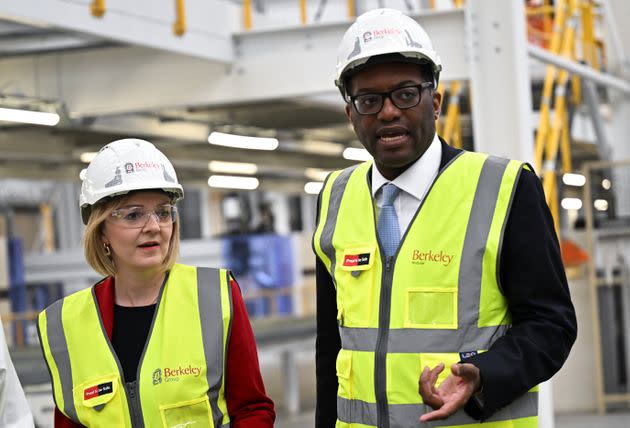Mini-Budget Gets A Pounding – But Right-Wing Think Tanks Are Loving It

Liz Truss and Kwasi Kwarteng visited Berkeley Modular in Northfleet, Kent, to promote the government's new Growth Plan. (Photo: Dylan Martinez via PA Wire/PA Images)
Kwasi Kwarteng has been accused of “betting the house” on economic growth after he announced plans to slash taxes for the rich paid for by a huge increase in government borrowing.
In a devastating assessment, the highly-respect Institute for Fiscal Studies said the chancellor had “put government debt on an unsustainable rising path” with the spending splurge.
Kwarteng used a so-called “mini-budget” to unveil radical plans to cut income tax for high-earners, end the cap on bankers’ bonuses, scrap planned rises in national insurance and corporation tax, and reduce stamp duty - a package set to cost £45 billion.
To pay for it, the government will borrow an extra £70 billion over the next six months.
The chancellor and prime minister Liz Truss believe the measures will eventually boost economic growth to 2.5 per cent a year.
But the money markets reacted badly to the announcement, with the value of the pound plummeting once again and the cost of government borrowing going up.
IFS director Paul Johnson said: “The chancellor announced the biggest package of tax cuts in 50 years without even a semblance of an effort to make the public finance numbers add up.
“Instead, the plan seems to be to borrow large sums at increasingly expensive rates, put government debt on an unsustainable rising path, and hope that we get better growth. This marks such a dramatic change in the direction of economic policy-making that some of the longer-serving cabinet ministers might be worried about getting whiplash.”
He added: “Mr Kwarteng is not just gambling on a new strategy, he is betting the house.”
In fact, the only analysts with anything good to say about the mini-budget were right-wing think tanks such as the Institute for Economic Affairs, whose director general, Mark Littlewood, described it as a “boost-up budget”.
He said: “It’s refreshing to hear a chancellor talk passionately about the importance of economic growth and supply-side reforms, rather than rattling off a string of state spending pledges and higher taxes.
“Only by bearing down on the amount of tax the state collects across the income spectrum, and reducing the regulatory burden, can we create better conditions for growth.”
But appearing on Sky News, Littlewood did concede: “You’re not going to like this package if you care more about the poor.”
“You’re not going to like this package if you care more about the poor.”
The Tories aren’t even pretending to care anymore.
The only levelling up they are doing is in the accounts of bankers, earners on £150,000+ and oil & gas companies. pic.twitter.com/dkUS7nqf5g— Sarah Owen MP (@SarahOwen_) September 23, 2022
Meanwhile, the Centre for Public Studies, whose director Robert Colville co-authored the last Tory election manifesto, was another fan.
Not to blow trumpet, but:
- Cancelling CT rise ✅
- Unapologetically pro-business agenda ✅
- Stamp duty ✅
- Opportunity Zones ✅
- Reversing NI rise ✅
- Childcare reform ✅
- Action on energy ✅
All they need is capital allowances and it’ll be a @CPSThinkTank full house…— Robert Colvile (@rcolvile) September 23, 2022
Business groups were also supportive of the chancellor’s measures.
Tony Danker, director general of the CBI, said: “This is a turning point for our economy. Like covid, the energy crisis has meant government has had to spend massively to protect people and businesses. That means we have no choice but to go for growth to afford it.
“Today is day one of a new UK growth approach. We must now use this opportunity to make it count and bring growth to every corner of the UK.”
Martin McTague, national chair of the Federation of Small Businesses, said: “The Truss government is off to a flying start. The chancellor has delivered pro-small business measures today and has rightly recognised that removing taxes on jobs, investment and entrepreneurs is essential for our economy.”
Today’s budget is a national disgrace.
Handouts for the rich, hardship for the rest.
Don’t accept it. Fight back. Join us at protests across Britain on October 1st.https://t.co/1SeHcIXdMrpic.twitter.com/iRriUgnaG9— Enough is Enough (@eiecampaign) September 23, 2022
But trade unions were scathing in their assessment.
Sharon Graham, general secretary of Unite, said: “This mini-budget is unashamedly a budget for the rich, big business and the City – highest earners’ tax slashed, corporation tax slashed, investment bankers’ bonuses let rip.
“Billionaires and City bankers will once again be considering which tax haven they will stash their money in, whilst millions of ordinary families continue to struggle to make ends meet.”
This article originally appeared on HuffPost UK and has been updated.

